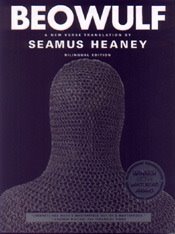
Your essay on Crime and Punishment is due on Thursday, October 19 (periods 3 & 5) or Friday, October 20 (period 4). You must write a 3-5 page essay on one of the open essay prompts that I distributed in class, or on a topic of your choice. Here are a few prompts reprinted from the list. Please do not read into their presence here - I don't prefer these prompts over the others in any way whatsoever.
2002. Morally ambiguous characters -- characters whose behavior discourages readers from identifying them as purely evil or purely good -- are at the heart of many works of literature. Choose a novel or play in which a morally ambiguous character plays a pivotal role. Then write an essay in which you explain how the character can be viewed as morally ambiguous and why his or her moral ambiguity is significant to the work as a whole. Avoid mere plot summary.
2001. One definition of madness is "mental delusion or the eccentric behavior arising from it." But Emily Dickinson wrote:
Much madness is divinest Sense-
To a discerning Eye-
Novelists and playwrights have often seen madness with a "discerning Eye." Select a novel or play in which a character's apparent madness or irrational behavior plays an important role. Then write a well-organized essay in which you explain what this delusion or eccentric behavior consists of and how it might be judged reasonable. Explain the significance of the "madness" to the work as a whole. Do not merely summarize the plot.
Much madness is divinest Sense-
To a discerning Eye-
Novelists and playwrights have often seen madness with a "discerning Eye." Select a novel or play in which a character's apparent madness or irrational behavior plays an important role. Then write a well-organized essay in which you explain what this delusion or eccentric behavior consists of and how it might be judged reasonable. Explain the significance of the "madness" to the work as a whole. Do not merely summarize the plot.
1994: In some works of literature, a character who appears briefly, or does not appear at all, is a significant presence. Choose a novel or a play of literary merit and write an essay in which you show how such a character functions in the work. You may wish to discuss how the character affects action, theme, or the development of other characters. Avoid plot summary.
1982: In great literature, no scene of violence exists for its own sake. Choose a work of literary merit that confronts the reader or audience with a scene or scenes of violence. In a well-organized essay, explain how the scene or scenes contribute to the meaning of the complete work. Avoid plot summary.
1981: The meaning of some literary works is often enhanced by sustained allusion to myths, the Bible, or other works of literature. Select a literary work that makes use of such sustained reference. Then write a well-organized essay in which you explain the allusion that predominates the work and analyze how it enhances the work’s meaning.
1981: The meaning of some literary works is often enhanced by sustained allusion to myths, the Bible, or other works of literature. Select a literary work that makes use of such sustained reference. Then write a well-organized essay in which you explain the allusion that predominates the work and analyze how it enhances the work’s meaning.
